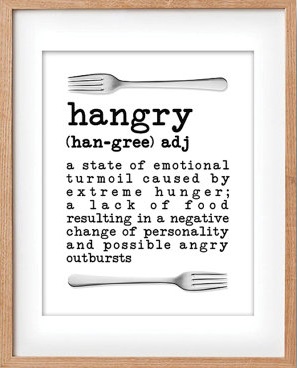Do you have the “hangry’s”?

Ever snapped at someone, or had someone snap at you, and then after having something to eat all is well with the world again? You might feel calmer, happier, and possibly embarrassed at your recent outburst! Well you may have just been hangry – referring to the state of being angry and irritable because you are hungry.
Despite the made up name, there is scientific evidence for the existence of this volatile emotional state.
Why is it so?
In a nutshell it’s usually due to low blood sugar levels (Hypoglycemia).
The foods that we eat (carbohydrates, proteins and fats) are digested into simple sugars (such as glucose), amino acids and free fatty acids. These nutrients are distributed to our organs via the bloodstream and used for energy.
As time passes, nutrient levels circulating in our blood stream starts to drop. If blood-glucose levels fall far enough, your brain will perceive it as a life-threatening situation. Our brains are critically dependent on glucose to do its job unlike most other organs and tissues in our bodies that can use a variety of nutrients to keep functioning.
It’s at this point that the brain might signal various organs in the body for more glucose to be released to the blood stream.
So if the brain doesn’t have enough energy, one of the first cognitive processes that suffers is self-control. Your ability to exert self control allows you to control your attention, regulate your emotions, cope with stress, resist impulsivity, and refrain from aggressive behavior.
What causes you to become hangry?
- Not eating enough. Portion sizes are important, but the nutrient density of your foods is more so. Each main meal and most of your snacks should include a good fat, protein, and lots of veggies (yes even breakfast!).
- Not eating frequently enough. Skipping meals, whether it is every now and then, or regularly (“I don’t eat breakfast” &/or “I’m too busy to eat lunch”).
- Carbs – relying on refined carbohydrates as your main energy source. This could be from grains, &/or sugars. You end up with a big energy hit and then crash.
- Minerals. Our mineral levels impact our ability to regulate blood sugar levels.
- Stress. Stress (and the anticipation of stress) signals the body to raise blood sugar levels to generate energy to respond to the stress. Some of the symptoms of hypoglycemia, such as irritability and nervousness, may sometimes be the effects of high levels of stress hormones rather than of the low blood sugar itself.
So if you’re always on a short fuse, or your mood is constantly swinging between cheerful and irritable or anxious, you should check what and when you’re eating to start with, or come in and have some simple tests done in clinic to measure what exactly is going on.

